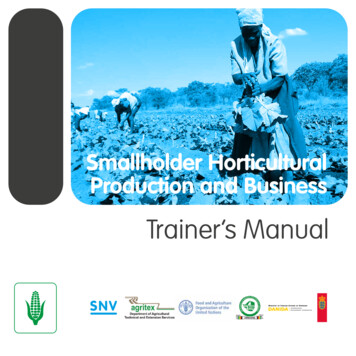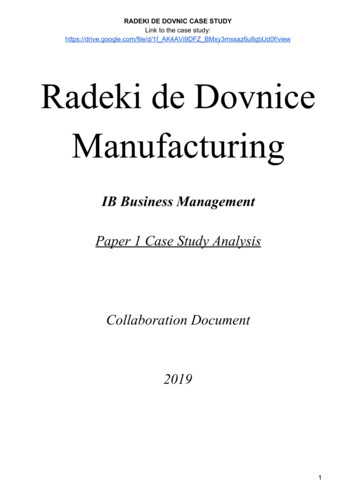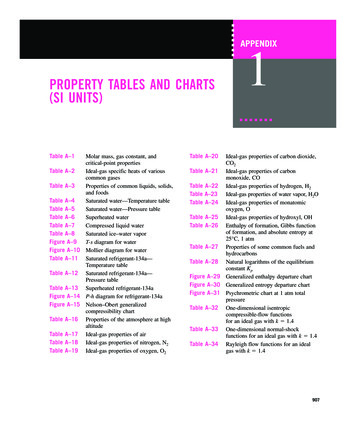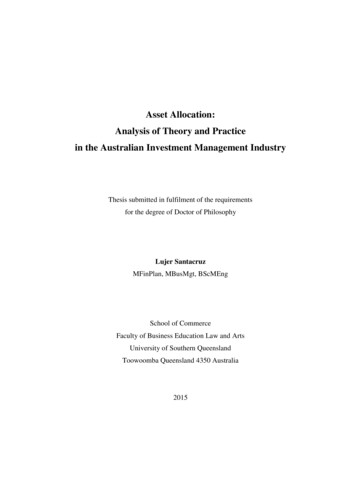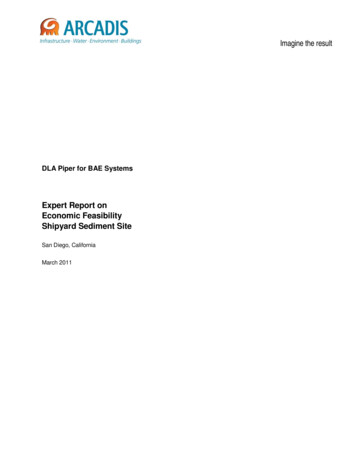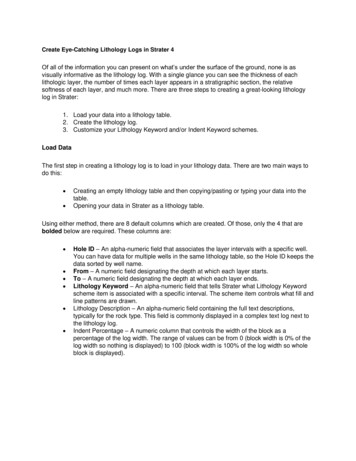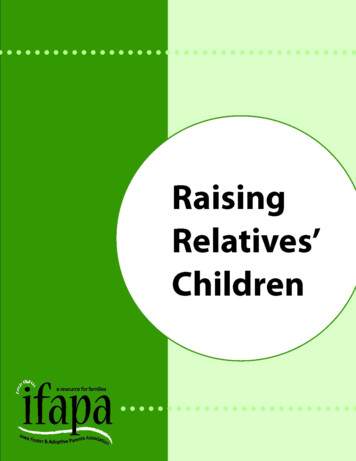
Transcription
Table of contentsIntroduction . . 3Understanding caregiver feelings . .4Understanding children’s issues . . . .5Parenting and discipline . .7Publications for kinship caregivers . . 8Helpful websites for relative caregivers . .9Financial assistance for relative caregivers . .10Health insurance . . 14Affordable childcare . . . 15Respite . . . 17Educational issues . . 18Children’s mental health services . . . 21Understanding ADHD . . . 23Other mental health issues . . . 24Understanding Fetal Alcohol Syndrome . . . 26Raising chemically-free kids . . 27Raising children of color . 29Internet safety . . 30What about parent visits? . . 31Preventing an abduction . . 32Talking with children about their parents . . 33Dealing with your own aging . 34This information is intended for educational use only. It is not legal advice. If youneed legal advice, seek the help of a lawyer.2
Raising Relatives’ ChildrenYou are not alone! More than six million children in the United States – about 1 in 12children -- are living in households headed by grandparents or other relatives. In many ofthese households, grandparents or other relatives are the primary caregivers for childrenwhose parents are unable to care for them because of: Alcohol and drug abuse Child abuse and/or neglect Mental health problems Teenage pregnancy Family violence Unemployment Incarceration Abandonment HIV/AIDS Divorce Poverty DeathIn Iowa, there are no statistics kept on how many children are cared for by their relatives,but social service providers agree that the number is increasing every year. Iowa policyrecommends that adult relatives be given consideration when a child is placed into fostercare, and many of these relatives are adopting the children they care for.Kinship caregivers come from all walks of life, all income levels, and all races. They livein cities, suburbs, and on farms. Some kinship caregivers are married; some raise thechildren by themselves. Kinship caregivers are grandfathers, grandmothers, aunts,uncles, older siblings, and even great-grandparents.The Iowa Foster and Adoptive Parents Association (IFAPA) supports kinship caregiversin a variety of ways. IFAPA created this packet of information for kinship families andthose that serve them.*Much of the narrative in this packet has been borrowed and reproduced with permission from First Steps,a publication of the Minnesota Kinship Caregivers Association. First Steps was written by Connie ClausenBooth, LICSW, and was published in 2002. IFAPA graciously thanks MKCA for allowing us to reprintinformation to benefit Iowa’s kinship families. Vist MKCA on the web at www.mkca.org.3
Understanding caregiver feelingsCaregivers often experience a roller coaster of feelings, such as: Guilt. You may feel that somehow the situation is your fault. Embarrassment. Caregivers may worry about what others will say or think. Anger. Seeing the children suffer at the hands of parents often angers relativecaregivers. Grief. You may grieve the loss of an adult child or the role as traditionalgrandparent, for example. Resentment. You may have given up personal hopes and dreams to take onchildrearing responsibilities. Isolation. When a child comes into your life, your circle of friends may change.You may lose old friends and have trouble making new friends. Fear. You may fear that you will lose the child to an abusive parent or the courtsystem. You may also fear the child will be abducted. Anxiety. Worrying about the children, their parents, and the future is commonamong relative caregivers. Depression. Overwhelmed with confused feelings and fatigued by responsibility,many kinship caregivers become depressed. Loss. You may have given up the dream that your child, niece, or nephew, forexample, will ever be a parent. This is especially poignant when relativecaregivers adopt. Hope. You may keep a spark of hope alive that the parents will straighten out. Love. Love is the driving emotion for most caregivers raising relative’s children.Reproduced in part with permission from First Steps, a publication of the Minnesota Kinship CaregiversAssociation. First Steps was written by Connie Clausen Booth, LICSW, and was published in 2002.4
Understanding children’s issuesThe children you are raising have likely experienced more trauma than some adults facein a lifetime. They have a variety of complex emotions.AbandonmentYoung Scott was left at the neighbors, and his mom never returned. Scott’s grandmacame to get him and brought him to her house. Scott was very scared that he would alsolose his grandma and grandpa. At first, he would not let them out of his sight. Scott evenbecame nervous when they went into the bathroom. He thought his grandma and grandpamight disappear down the drain. He does not know where his mom is, and he has heardnothing from her. Scott does not know if she will ever come back for him.Grief and lossBilly’s mom packed up his things one night and took him to her sister’s house. Billy hadjust made a new friend in his neighborhood when he had to move. He was on a soccerteam for the first time, and now he can’t play. Billy’s mom forgot to pack his favoritebear and pillow. Billy’s aunt, who used to let him get away with stuff, now makes himcomplete his homework before he is allowed to watch T.V. and makes him go to bed ontime. Billy doesn’t know where his mom is, why she left him, or when she will comeback. He misses her and is worried that he won’t see her again.Low self-esteemAndrea wonders what she did wrong. She thinks she must be really bad if her mom doesnot want her. Andrea wonders if she is stupid or if something else is wrong with her.What particularly upsets Andrea is that her mom is keeping her new baby, but notAndrea.Fear and insecurityMarcus lays awake at night, worrying that his mom will not ever come back for him. Atthe same time, Marcus wonders what will happen if she does return for him. Will hismom be able to take care of him? Marcus is getting used to not being hungry, and he isstarting to feel safe. He worries about what will happen to him if his aunt gets sick orgoes away. Where will he go?AngerSam punched his grandma today. He cannot explain what came over him. Sam said hefelt like he would burst if he did not punch someone. His grandma was there, and it waseasy to take out his anger on her. Sam feels terrible about what he did. He loves his5
grandma and knows she did not deserve it. Sam is really mad at his mom, but he doesnot know how to show his feelings without taking it out on others.Confused feelingsJenny says she hates her mom but, at the same time, she misses her very much. Jennywants to go home, but she does not want to leave her grandparents. Jenny wonders if hermom could move in with her grandparents and her. Sometimes Jenny questions if theyare keeping her from her mom. But Jenny knows her grandparents are very good to herand love her a great deal. Other feelings also confuse Jenny because her mom’sboyfriend used to touch her in ways she did not like. When Jenny thinks about that, shegets real mixed up inside. She wishes she could get those thoughts out of her head.Common behaviors of children in kinship care School difficulties such as poor grades and difficult behavior.Doesn’t pay attention for long; can’t concentrate.Will not let the caregiver out of sight; clings to the caregiver.Reverts to behavior like thumb sucking and bedwetting.Will not sleep alone or with the light off.Eats too fast, too much, or hides food.Takes care of brothers and sisters like a parent should.Difficult behaviors after a parent’s visit.Exhibits inappropriate sexual behavior.Appears to be withdrawn, daydreaming, or unusually quiet.Reproduced in part with permission from First Steps, a publication of the Minnesota Kinship CaregiversAssociation. First Steps was written by Connie Clausen Booth, LICSW, and was published in 2002.6
Parenting and disciplinePerhaps it’s been awhile since you parented a child. Or perhaps you’d never been aroundkids until this child moved in. Often relative caregivers are thrown into parentingsituations for which they aren’t completely prepared. Below are a few tips and resourcesto get you started. It’s never ok to hit a child. You may have spanked your children when they weregrowing up, or you may have been spanked when you were raised, but today mostexperts agree that spanking is never acceptable. Time-outs are widely used today.Be consistent and follow through.Be firm yet kind and fair.Set clear consequences, and enforce them right away.Pick your battles. Kids aren’t perfect. Choose which behaviors you are willing tolet slide, and focus on the important issues.Model appropriate behavior.Reward behaviors you want to see again.Catch kids being good and praise that behavior.Give them structure so they know what to expect.State expectations early and often.Provide when/then statements, such as “When you clean up your room, then youmay play outside.”Give children limited choices whenever possible, such as “Would you like towear the red dress or the blue dress?” rather than, “What do you want to wear?”Encourage them to talk about their feelings.Let them know all feelings are okay, even mixed-up feelings.Say you’re sorry when you make a mistake.Let them know you will always love them, even when they make mistakes.Books on parenting and discipline1-2-3 Magic: Effective Discipline for Children 2-12 by Thomas W. Phelan, PhDThe Explosive Child: A New Approach for Understanding and Parenting EasilyFrustrated, Chronically Inflexible Children by Dr. Ross W. GreeneHow to Talk So Kids Will Listen & Listen So Kids Will Talk by Adele Faber and ElaineMazlishParenting the Hurt Child: Helping Adoptive Families Heal and Grow by Gregory Keckand Regina KupeckyParenting With Love and Logic: Teaching Children Responsibility by Foster W. Clineand Jim Fay7
Publications for kinship caregiversCallander, Joan, Second Time Around; Help for Grandparents Who Raise TheirChildren's KidsCallander discusses her own, sometimes painful, experiences of raising her grandson.This book offers personal and practical advice for grandparents raisinggrandchildren.de Toledo, Sylvie and Deborah Edler Brown, Grandparents as Parents: A Survival Guidefor Raising a Second Familyde Toledo is a founder of the national support group “Grandparents as Parents,” orGAP. In this book, the authors describe the legal, medical, and financial issuesgrandparents raising grandchildren face. They also discuss how to deal with drugs,counseling, and special education needs.Doucette-Dudman, Deborah and Jeffrey R. Lacure, Raising Our Children’s ChildrenDoucette-Dudman is also a founder of the national support group “Grandparents asParents,” or GAP. When her daughter-in-law was arrested on drug charges, she filedfor custody of her grandson. In this book, the authors discuss why some birthparentsdon’t raise their children, the choices grandparents must make, the ongoingrelationships with birthparents, and dealing with legal and social service systems.“First Steps: Getting Started Raising Relatives' Children,” available at www.mkca.orgHoutman, Sally, To Grandma's House, We.Stay: When You Have to Stop Spoiling YourGrandchildren and Start Raising ThemThis book guides grandparents through the obstacle course of emotions, conflicts,and social considerations they face when raising a grandchild.Osborne, Hilda, Ticklebelly Hill: Grandparents Raising GrandchildrenThe author says while she was happy to provide her grandchildren with a stablehome, she was heartbroken and guilty that her daughter could not. She describes herbook as a lighthearted yet serious look at life after the grandkids move in.Schooler, Jayne, “Mom, Dad . . . I’m Pregnant”: When Your Son or Daughter Faces anUnplanned PregnancyThe author describes her personal journey as her daughter faced and unplannedpregnancy. She describes the varying emotions grandparents feel and the varying choicesfamilies make, including when grandparents parent their grandchildren. Schooler has aMaster’s from a Divinity school and this book is on a Christian press, so there areChristian themes throughout.“Ties That Bind Handbook,” available at www.coaf.orgThis 91-page handbook is designed to help kinship care providers deal moreeffectively with new child-rearing responsibilities due to their relative’s addiction.8
Helpful websites for relative s/The AARP has the following articles online for grandparents raising grandchildren: Dealing with Your Grandchild’s Difficult Behaviors. Finding Health Insurance. Helping Grandchildren Cope with a Parent’s Addiction. Your Grandchild’s Parent is in Prison. Help Your Grandchildren Succeed in School.The AARP Grandparent Information Center also publishes a free newsletter, “GICVoice.” You may sign up online to receive the newsletter.Administration on Aging caregiver resourceswww.aoa.gov/caregiversThe Children’s Defense Fund (CDF)www.childrensdefense.orgCDF provides information and resources on kinship care, including guides on healthinsurance, nutrition, child care programs, and programs for children with disabilities.Children of Alcoholics Foundationwww.coaf.orgCOAF supports children, birthparents, and kinship caregivers as they struggle with theoverlap of kinship care and parental substance abuse. Free dowloadable articles areavailable for adults and children.Generations United: National Center on Grandparents and OtherRelatives Raising Childrenwww.gu.orgThe Iowa Department of Elder Affairswww.state.ia.us/elderaffairsThis website has links to Iowa’s Area Agencies on Aging, which provide advocacy,educational and prevention services to older Iowans.Iowa Family Caregiver Supportwww.iowafamilycaregiver.orgIowa Family Caregiver Support provides information on a variety of topics, including: Locating local services to help you care for your loved one. Resources that will help families in caregiver roles. Special Assistance funds for meeting needs not already covered by an existingprogram or organization. Upcoming classes on a variety of care giving issues.Also provides an IFCS Information Specialist at 1-866-4-NURTURE (1-866-468-7887).9
Financial assistance for relativecaregiversFamily Investment Program (FIP)The Family Investment Program (FIP) is Iowa’s cash assistance program under thefederal Temporary Assistance for Needy Families (TANF) program.The Family Investment Program provides financial assistance and work opportunities toneedy families with children. FIP offers training or education and may help withtransportation and childcare expenses. You may also receive matching funds for moneyyou set aside for education, for purchase of a home, or to start a new business. Childrenmay be eligible to receive funds through a TANF “child-only grant.” A grandparent’sincome is not considered when deciding a child’s eligibility for this grant, and workrequirements are waived.For more information, contact your local Department of Human Services office, listed inthe blue pages of the phone book.Social Security dependent’s or survivor’s benefitsThe Social Security Administration sends monthly checks to workers who are retired ordisabled. Survivor’s benefits are payable to children on the record of a parent who hasdied. In some cases, grandchildren can also receive benefits.A child can continue receiving dependent’s or survivor’s benefits until age 19 if he or sheis a full-time student in elementary or high school.For more information, contact your local Social Security office, listed in the blue pages ofthe phone book, visit www.ssa.gov, or call 1-800-772-1213.Supplemental Security Income (SSI)If a child you care for meets Social Security’s definition of having a disability and if theirincome and assets fall within the eligibility limits, the child may qualify for SSIpayments.Definition of disability for children includes: A physical or mental condition or conditions that can be medically proven andthat result in marked and severe functional limitations. The medically proven physical or mental condition or conditions must last, or beexpected to last, at least 12 months or be expected to result in death. A child may not be considered disabled if he or she is working a job considered tobe substantial work.For more information, contact your local Social Security office, listed in the blue pages ofthe phone book, visit www.ssa.gov, or call 1-800-772-1213.10
Foster care paymentsIf a child is placed in the legal custody of DHS, and the kinship caregivers are licensedfoster parents, the kinship caregivers may be eligible to receive foster care payments onbehalf of the children in their care. The child would need to be placed in the caregiver’shome by DHS and the court as a foster care placement.For more information, contact the Department of Human Services, listed in the bluepages of the phone book.Women, Infants and Children (WIC)Women, Infants and Children, or WIC, is a public health program that provides nutritiousfood, nutrition education, and referrals to other health care agencies to qualifyingfamilies. Participants receive checks for nutritious food redeemable at more than 700grocery stores and pharmacies across Iowa. There are WIC clinics in all 99 Iowacounties.WIC Eligibility is based on income, Iowa residence, and a medical or dietary need. Ifyour child receives Title XIX and is under the age of 5, he or she may be eligible,regardless of your income. If your child does not receive Title XIX and is under the ageof 5, he or she may qualify based on income. Many working families participate. Afamily of four can make more than 34,000 and still qualify. Relatives can apply forWIC if they or the children they raise meet the eligibility criteria.For more information, call the state WIC office at 1-800-532-1579.Food stampsEligible, low-income families can receive assistance to buy food if they meet certainincome and asset requirements set by the program.For more information, contact your local Food Stamp office, listed in the blue pages ofthe phone book under "Food Stamps," "Social Services," "Human Services," or "PublicAssistance." You may also call Iowa’s Food Stamp information line at 1-877-937-3663.Free or reduced school lunches and Summer Food Service ProgramThe National School Lunch Program and the National School Breakfast Program arefederally assisted meal programs operating in public and non-profit private schools andresidential child care institutions. Children from families with incomes at or below 130percent of the poverty level are eligible for free meals. Those with incomes between 130percent and 185 percent of the poverty level are eligible for reduced-price meals, forwhich students pay no more than 40 cents. (For the period July 1, 2004, through June 30,2005, 130 percent of the poverty level is 24,505 for a family of four; 185 percent is 34,873.) Adoption subsidy payments are counted as part of family income whenapplying for free or reduced lunches.11
The Summer Food Service Program (SFSP) provides free, nutritious meals and snacks tohelp children in low-income areas throughout the summer months when they are out ofschool. Children 18 and younger may receive free meals and snacks through SFSP.For more information, talk to the principal or office staff at your child’s school.Low Income Home Energy Assistance Program (LIHEAP)LIHEAP helps low-income households with their heating and cooling bills. It can alsohelp pay for energy-related home repairs.For more information, visit mlor call the Chief of the Bureau of Energy Assistance in Des Moines at 515-281-0859.Adoption subsidyWhen the parental rights of a child with special needs are terminated and the child isplaced in the custody and guardianship of DHS, they may be eligible for adoptionsubsidy. Adoption subsidy is assistance provided for children with special needs as anincentive to promote adoption and permanency. An Adoption Subsidy Agreement isnegotiated between DHS and the family prior to finalizing an adoption. Adoption subsidyis based on the needs of the child and may include a monthly maintenance payment,medical coverage through the Medicaid program, or required special services.If a child adopted through DHS is not eligible for assistance at the time of the adoption,but is at risk of developing special needs, the family may negotiate a Future NeedsSubsidy Agreement with DHS. This means the child will not receive adoption assistanceat the time of the adoption but may be eligible for assistance if they develop special needsand meet the DHS eligibility guidelines.Contact your DHS Adoption Worker or the IFAPA Adoption Information Specialist inyour area for additional information.Adoption tax creditThe federal government has an adoption tax credit for families who adopt children. Thiscredit of approximately 10,000 can be used to deduct qualifying expenses for theadoption of your grandchild or relative. This tax credit may be applied against federal taxliability over the five years following the adoption.An adoptive parent or couple that finalizes an adoption of a child with special needs andearns less than 150,000 (income to 150,000 for full credit, phased out at income of 190,000) can claim the full credit, without documenting that they incurred specificadoption-related expenses.Contact a local tax expert or accountant to verify eligibly for this tax credit. Foradditional tax information, contact the Internal Revenue Service at 1-800-829-1040 orvisit its website at www.irs.ustreas.gov IRS publication: 968.12
Earned Income Tax Credit (EITC)This program provides a federal tax credit to workers with incomes up to 36,000 whoare raising children. You do not have to be the child’s legal guardian or custodian, andthe child does not have to be your dependent as defined by the IRS. The child must havelived with you for more than ½ of the year and be under age 19, a full-time student underage 24, or totally disabled. Caregivers must complete an income tax return in order toreceive EIC.For more information, visit www.irs.gov or contact a local tax expert.Child and Dependent Care CreditThis credit helps families who must pay for childcare while they work or look for work.The amount depends on the number of children you’re raising, your income, and the costof childcare. Usually the child must be your dependent, as defined by the IRS.For more information, visit www.irs.gov or contact a local tax expert.Child tax creditThis program offers a child tax credit of up to 1,000 per child. The child must be yourdependent, as defined by the IRS, and the child must be younger than 17.For more information, visit www.irs.gov or contact a local tax expert.National Council on the Aging (NCOA) benefits check-upwww.benefitscheckup.orgThis website helps people ages 55 and over find programs that may pay for some of theircosts of health care, utilities, etc.13
Health insurance for your childrenPrivate insuranceYou may add a child in your care to your health insurance per your health insuranceprovider or after an adoption is finalized. Your private insurance will be the child’sprimary insurance, with Title XIX the secondary insurance, where applicable. Talk toyour health insurance provider to verify eligibility and benefits available to children inyour home.Title XIXChildren who receive DHS adoption subsidy qualify for Iowa Title XIX medical benefits.If you add your child to your private insurance, Title XIX becomes the secondaryinsurance. Contact your adoption worker or your IFAPA Adoption InformationSpecialist for more information.hawk-i, or Healthy and Well Kids in Iowahawk-i is a program that provides health care coverage for Iowa children in families withlimited incomes. A family does not pay more than 20 a month, even if several childrenqualify for hawk-i.To qualify, a child must live in Iowa and: Be under 19 years old Have no other health insurance Be a citizen of the United States or a qualified alien Be in a family that meets the hawk-i income limits Cannot be the dependent of a State of Iowa employee Children who qualify for Medicaid cannot get hawk-iFor more information, call1-800-257-8563, 7 a.m. to 7 p.m. Monday through Friday orvisit www.hawk-i.org. Also, TDD: 1-515-457-8051 or 1-888-422-2319.14
Affordable childcareChildcare and referralThere is a childcare and referral agency for every county in the state.Visit www.iowachildnetwork.org for more information.Financial assistance for childcareChild Care Assistance (CCA) helps families pay for childcare costs for children under theage of 12 and for special needs children under the age of 19. Family income must bewithin the program limits, and the parent must be absent for a portion of the day due toemployment or participation in academic or vocational training.Assistance may also be available for a limited period of time to the children of a parentlooking for employment or when the parent who normally cares for the child is unable todo so due to hospitalization or outpatient treatment for physical or mental illness.You may get help from the CCA program if you: Have a child who needs care who is under the age of 13 (or under the age of 19 ifthe child has special needs) andAre a member of a Family Investment Program (FIP) household.If you’re not a FIP participant, you may qualify for the CCA program if you: Have a child who needs care who is under the age of 13 (or under the age of 19 ifthe child has special needs), andHave income under the program’s limits, andWork an average of 28 hours per week; orAttend an approvable training or education program full-time; orAre looking for work; orAre unable to provide care because of an approved medical reason.For more information, contact your county DHS listed in the State or CountyGovernment section of your local phone book, under "Department of Human Services" or"Human Services.”15
Your childcare options Group family childcare offers an in-home setting of family childcare for up to14 children. With more than 12 children, two adults must be present.Childcare centers provide care for larger numbers of children for half or full day.Head Start is a child development program designed to promote the growth anddevelopment of children from low-income families. Children ages three to fiveyears attend. Early Head Start provides learning and development services forfamilies with children up to age three. Both Head Start and Early Head Start maybe provided in a center or home-based setting. Visit www.ehsnrc.org to locate aHead Start program in your area.Early childhood education programs provide structured school settings forchildren ages two and older.Parent’s day out programs offer part-time childcare for preschool-age childrenin recognition of parents' need for personal time.Before- and after-school programs are usually located in schools, childcarecenters, family childcare homes, churches, or other settings offering childcare.16
RespiteDirect Family Access RespiteThe Direct Family Access Program assists families who need respite care but arenot eligible for respite services from any other source or have exhausted other resources.Administered by the Iowa Respite & Crisis Care Coalition (IRCCC), this program is forfamilies who have a respite care provider but need financial assistance to pay for the care.The maximum annual award is 400 per individual. In addition, a special mental healthblock grant was received that will allow up to 1,000 per individual (maximum of 2,000per family) to be awarded to families with a child or children with a documented severeemotional disorder, or SED.For more information or for an application, call IRCCC at 1-877-255-3140 orvisit www.irccc.com.Crisis respiteCrisis childcare is care that is provided to children at risk of abuse or neglectduring a family crisis. It provides a temporary, safe environment for children whoseparents are unable to meet their needs due to overwhelming circumstances or anemergency in their lives.Contact your IFAPA Adoption Information Specialist or a local crisis hotline formore information.Adoption respiteIFAPA administers the Adoption Respite Program. Adoption Respite is availableto DHS adoptive families for subsidized adopted children. Each adopted child who issubsidized is eligible for five days of respite per fiscal year at the rate of 15 per day.You must find your own respite provider.For more information, call IFAPA at 1-800-277-8145, extension 165, or contactyour IFAPA Adoption Information Specialist.Camps and recreation programsCamps and recreation programs can provide valuable experiences for children whilegiving caregivers a much-needed break. Consider: Local recreation departments YMCA or YWCA Boys and Girls Club 4-H Girls Scouts and Boys Scouts Church camps Camps for children with special needs, such as Camp Courageous and CampSunnysideOther respite programsCheck out www.archrespite.org, the ARCH Respite Network and ResourceCenter to locate other respite opportunities.17
Educational issuesParents and caregivers want their children to have a positive and rewarding schoolexperience. Children who are not living with their birthparents may face manychallenges in school. Those challenges may b
Fear. You may fear that you will lose the child to an abusive parent or the court system. You may also fear the child will be abducted. Anxiety. Worrying about the children, their parents, and the future is common among relative caregivers. Depression. Overwhelmed with confused feelings and fatigued by responsibility,
